A little while ago I was contacted on Instagram by an organisation called Art Meets Education. I’m not always the most responsive person when it comes to messages on instagram, but something about this particular account caught my eye. We had a little bit of a chat on the direct message chat on there, and it soon became clear that what his organisation was doing was both something that interested me on a personal level and also something that I would really like to bring a bit of attention to through the blog. We soon agreed to a bit of an email interview. The following is the outcome of that conversation:
H: Hi Nico, so let’s start with the basics, who are you and what’s your background?:
N: I’m Nico Klein-Allermann, founder of Art Meets Education. I also work as a photographer and model / actor, and I’m currently living in Berlin. I am the son of a Filipina mother and a German father. Photography is my life and profession. My interest as a freelance photographer includes socially and structurally discriminated against people. My images command the viewer to witness the poignant lives of the people I photograph, but I eventually I recognized that creating moving photographs is not enough. Emotions are fleeting. One moment of sympathy alone cannot change the lives of my subjects, let alone have a deep enough societal impact.
This was a theme I was thinking about for a long time, but a few key things happened which influenced my actions. The first took place during a work trip of mine. I let some young kids use my camera. When they gave it back to me, I was stunned by their captures. They made images I never could have made – their viewpoints were so unique!
The second catalyst was Johnny. He and I were the same age. Whenever I visited my family in the Philippines, I would always see him at the same street corner selling barbecue. As I went to university and began my career as a photographer, Johnny continued to work at the same barbecue stand. My life progressed while his life remained the same. I realized on a profound level that my success mostly had to do with the opportunities I was given when I was young.
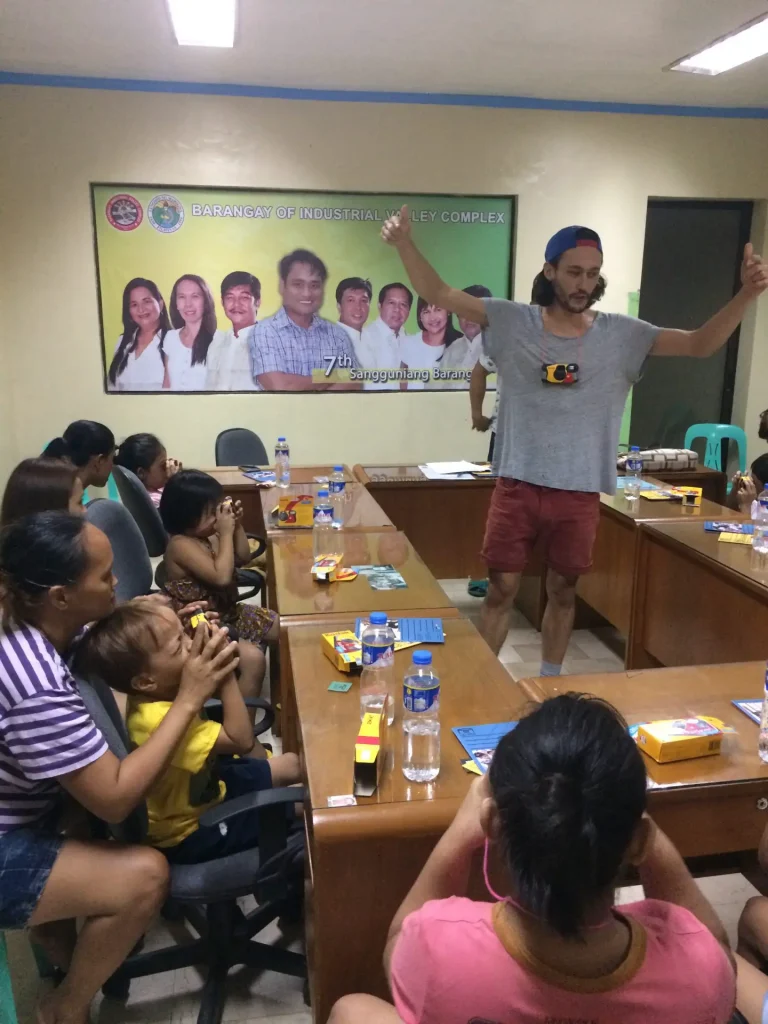
H: Ok, so tell me about how this influenced you, in simple terms, what is Art Meets Education?
N: Art Meets Education is an NGO which educates children through photography.
AME’s vision is education through photography. It sprang from the belief that every child has an inherent creative ability. We want to show our kids that this creative potential can help them earn their own money and pay for their education. The reality is that we see the kids as our artists – we merely work to encourage and represent them.
In December of 2016, I founded Art Meets Education (AME). Through education, anyone can be given the tools for self-fulfillment and escape a life of poverty.
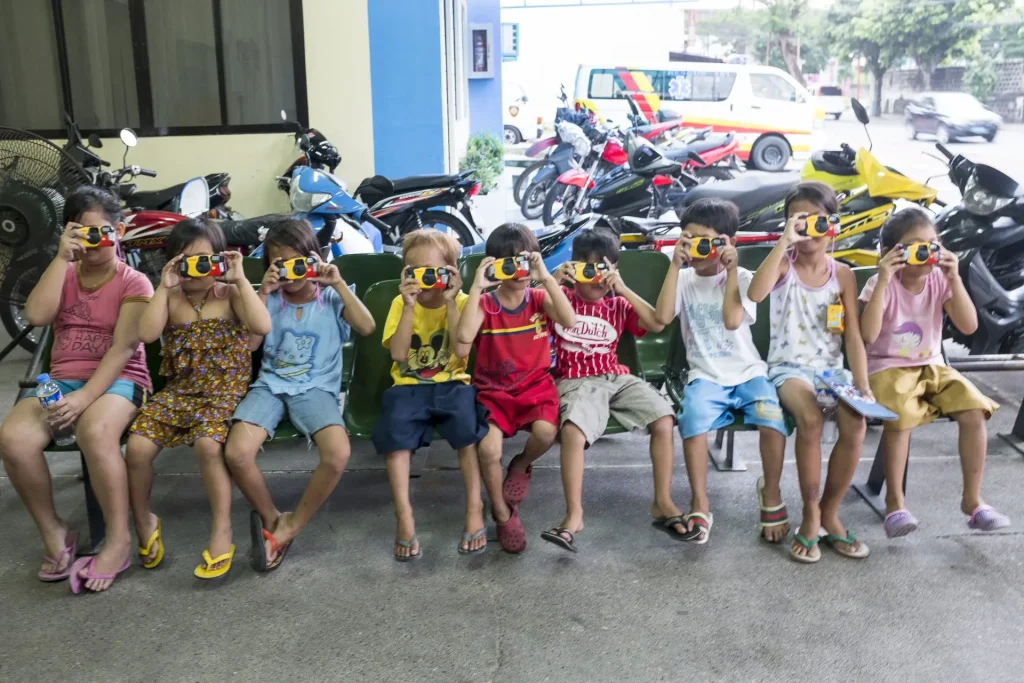
H: That’s really interesting. I have experience of this sort of thing locally to me. Some time ago I worked on a creative project with some homeless hostel services users – they were given cameras and encouraged to document their lives. It was amazing to see how much they engaged with it and how happy the process of being creative made them. It sounds like you take this to another level though?
N: Yes, I believe that every child has their own unique creativity. Picasso once said, “Every child is an artist. The problem is how to remain an artist once we grow up.” I have seen these kids take amazing pictures without guidance, which means there is an inner compass that guides them. I then thought, why not sell these artworks and make money from it so the kids can go to school?
When I saw these street kids or really poor families during my magazine assignments or exhibition preparations, I asked myself, “Can photography create education?” This was the driving question when I started the first project. And within one exhibition, we made around 1000€, which meant that one child was already able to go to school for 12 years. This was the answer to my question, so I went for it.
Now we have many artists who want to be represented by AME. But since we finance 12 years of school for each child, we are very cautious with expanding so we can secure the education of the kids already in the program. The hardest was/is to build a solid structure within the NGO, since we have an operation in the Philippines, and we also do the selling and marketing here in Berlin.
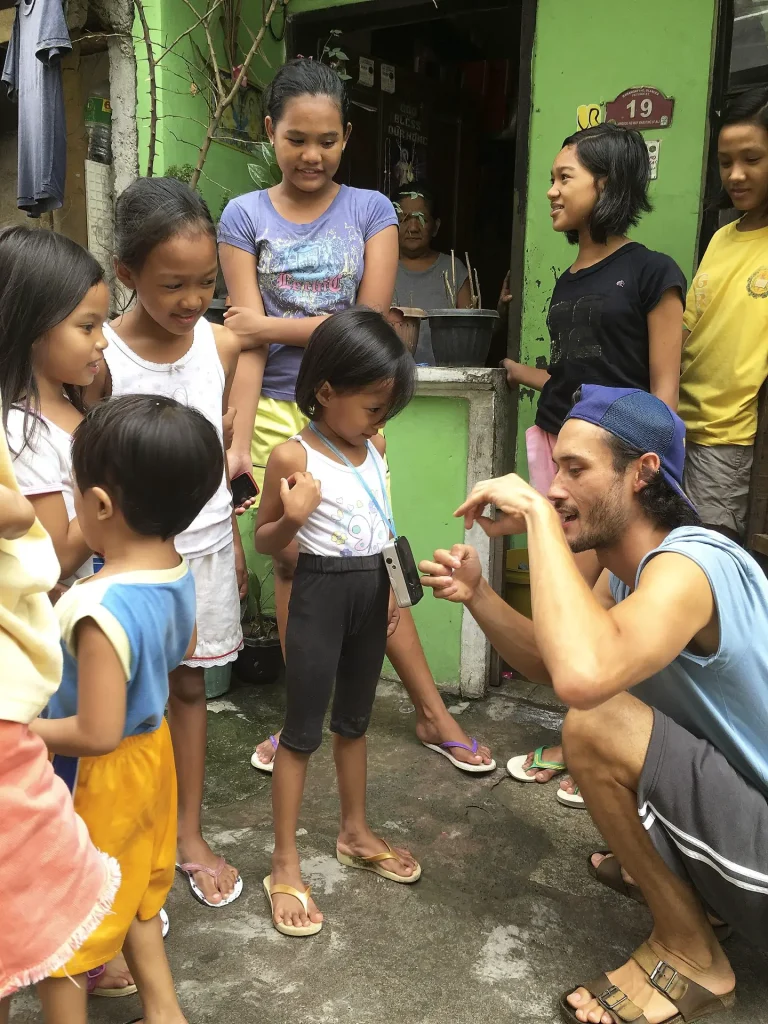
H: Ok, so it strikes me that there is a level of empowerment that happens with what you do. It’s not just about the creativity in itself, but also about demonstrating the innate value in that creativity – that is what we are talking about here, right?
N: Yay, you are correct. Art can heal, art can connect, art can help you work through things, AND NOW I KNOW THAT IT CAN EDUCATE. Education is the key to self-fulfilled and independent life. Only with education can you make your own well-informed decisions – and that is empowerment. When we sell one poster, one child will go to school for one month. There is a direct correlation between artwork and education.
Not only can the kid go to school, but also the artwork leaves an effect on the buyer as well. Every child is a documentary photographer, as they show their life from their perspective. So through their photographs, they become a messenger, they are seen and the viewer can see them.
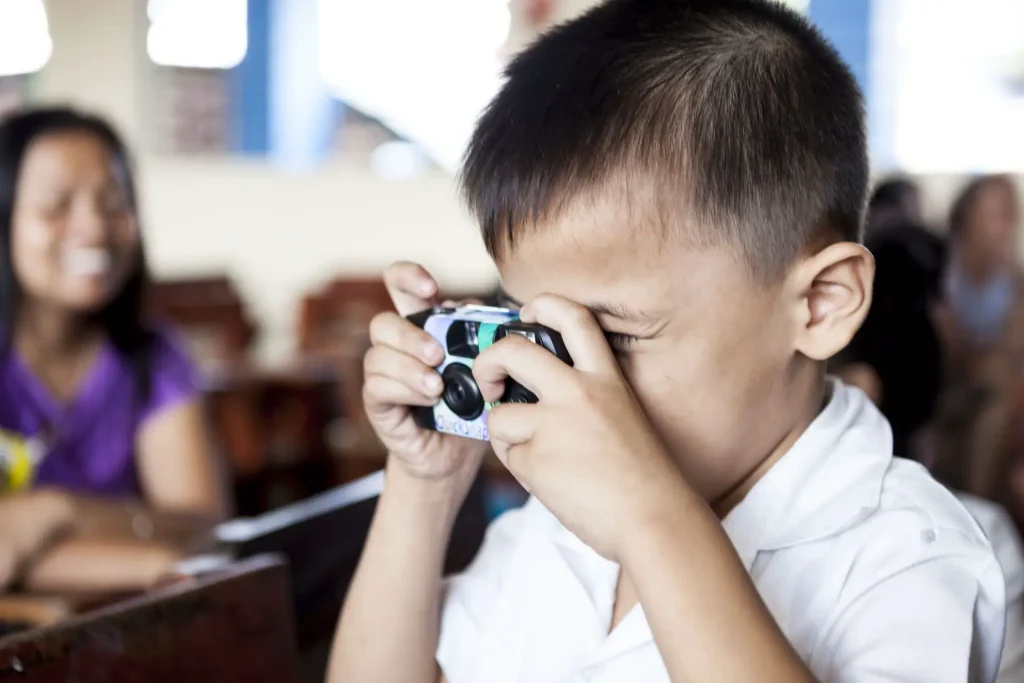
H: So tell me a bit about who these kids are, where they are in the world, and what their lives are like?
Basically, these are kids who can’t afford to go to school, or they are at a high risk to drop out because money is scarce. And there are a lot of kids like this, sadly. So, we have three rules for how to find our artists:
1. The child should be between five and nine years old. If they are older, it is very hard to keep them in school. Many are already used to working instead of going to school. If they are younger than five, then it’s too hard for them to understand the photography workshop or the camera itself.
2. The child is either not currently going to school because their family lacks the money, or he/she is at risk of dropping out for the same reason.
3. There must be parental interest and support for the child to go to school. Many parents don’t particularly want their kids to go to school if it can take away from an opportunity for them to work and make some quick cash.
All of our artists come from very poor families. These families sometimes have eight or nine children and live together in a 12m squared room. They are used to these living conditions, but every time I am confronted by what they must endure, it leaves me angry and sad.
Some of our artists no longer have parents anymore due to drug wars. Some parents are in prison and the children are raised by their grandmother, who’s maybe 85 years old. These circumstances are dire and heartbreaking – so much so that I felt like I had no choice but to become involved immediately.
Our current project is located in Manila, Philippines. We have our own office there, and we partnered up with an elementary school and high school.
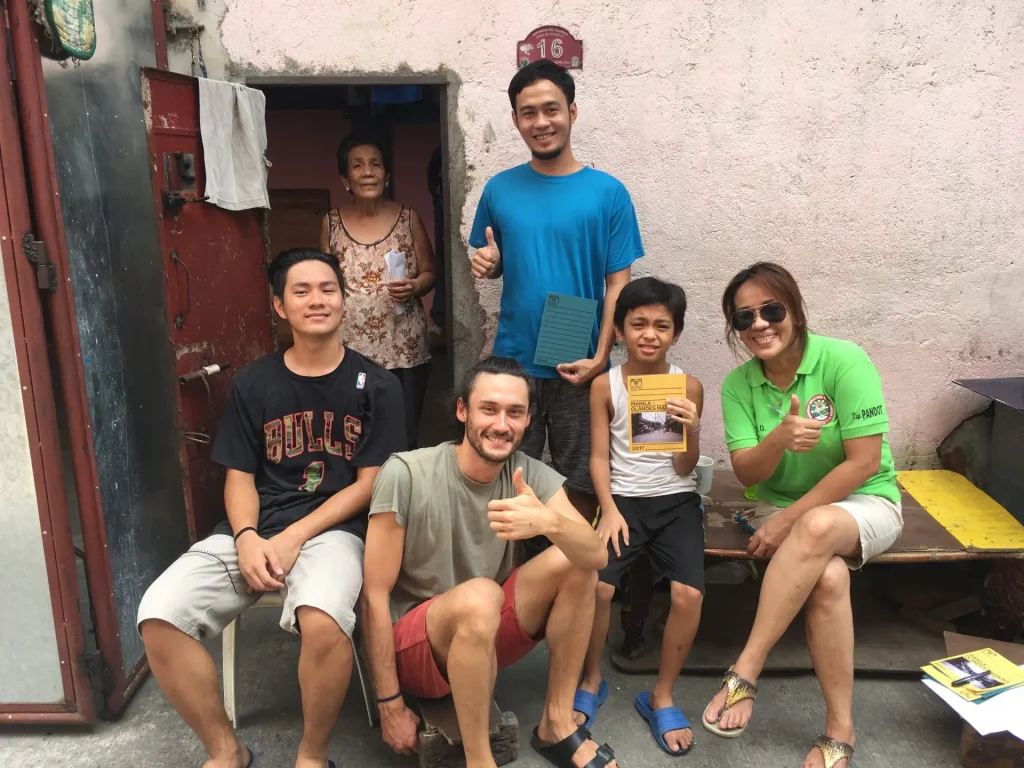
H: So you’ve been going 3-4 years? How’s the project gone so far? Have you seen success, is the project working, are the kids staying in education, are you seeing lives improve?
N: Yes, we started September 2016 and founded the official NGO December 2016.
The project is going very well. The creative phase (making the pictures) is the easy part. What’s harder is the monitoring of the artist once they start going to school. Since we pay for 12 years of education, we needed to create a system in which we can check if the kids continue to go to school and that the parents didn’t sell their uniform or send them to work. That’s why we work very closely with the school in Manila and the official institutions in terms of monitoring the kids and parents. They help us a lot.
Some kids from our first project in 2016 are already teaching photography to the newer students. Like John Wesley for instance, who is now 13 years old and helps AME with the photo workshops. That is amazing and exactly what we are looking for – that those who receive education continue the cycle and educate the next generation.
We now have 27 kids going to school, and all of these kids would not have been able to go to school otherwise. This achievement of receiving proper education is the direct result of just because their photographs . And yes, all of these kids are staying in school. Unfortunately, one child was taken out of the program due to the family’s money situation. The kid was forced to go to work. But most of the time, the parents are aware that education is the only way out of their poor living circumstances.
This year, we had our first student moving forward from elementary school to high school. Without AME, he would have been only able to finish elementary school for basic reading and writing skills.
Once our artists finish high school, they will be able to get proper jobs with decent payment. So yes, their lives are improving.
But the main improvement we can see is in their self-esteem. Once they have realized that all the money for their education comes from the sales of their own photographs, they become really proud of themselves.
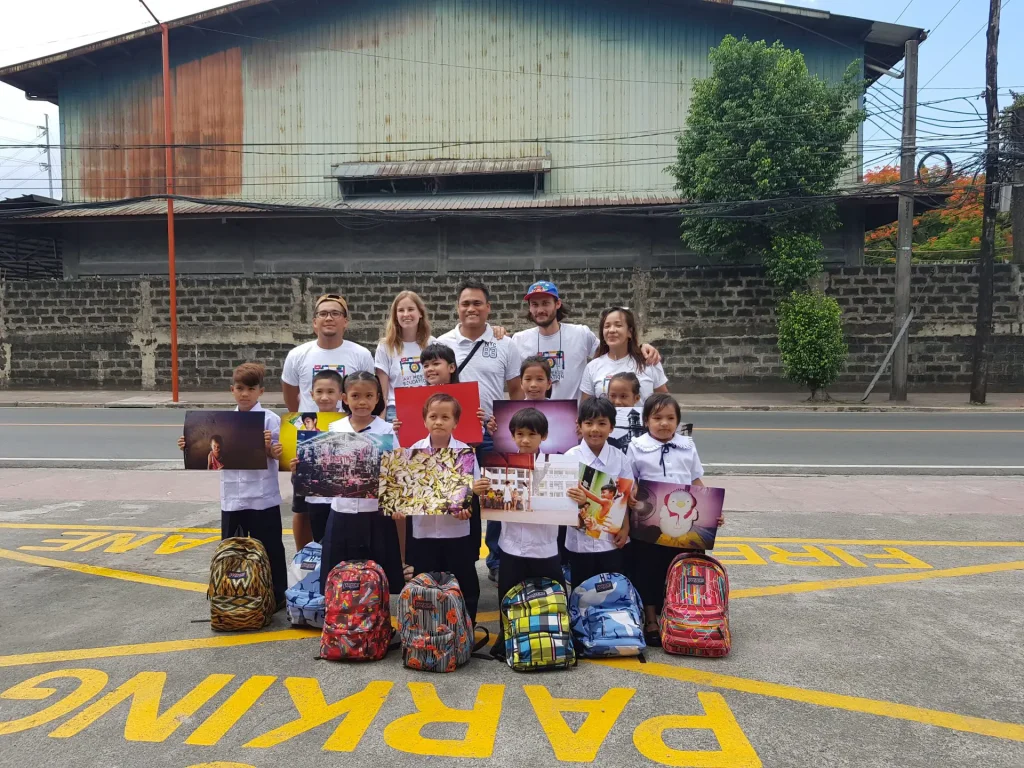
H: That’s fantastic, you must be so proud of them! You should be, and for what you’ve achieved! So what’s next then, what’s the next goal for AME, what does the future hold?
N: Thank you very much for the kind words. We are all proud of what the kids and we could achieve. But it is so much work to build up a NGO from nothing, from just an idea. AME is stabilizing and we have time and the serenity to think about where we are going. First, we all need to decide if we want to make it a “bigger NGO”. With this decision comes a lot more work, more financial pressure, but also we can get way more kids enrolled in school. We are all working full or part-time and AME is our job on the side. I want to grow AME and make it big. But it’s a decision that the team needs to make. They must go the extra mile everyday after work until AME has the financial funds to pay them a regular salary. For that, we need financial supporters / investors – people who believe in our vision.
But if we decide to go bigger, this is my vision:
The pilot project in Manila was the start. I want to get kids all over the world into school through photography. Over 200 million kids can’t go to school or have access to proper education, and all of these kids are great photographers. We want to create a collection of artwork from kids all over the world, from different cultures and different lives. These photographs will not only put the kids through school, but they will also provide documentation of different cultures around the world!
We are seeking a big photographer with a big heart and deep motivation to help, like Salgado, to become our ambassador. Over the next year, we will build up our network with local NGOs in the countries that will cooperate with us.
Since we started in the Philippines, it will always be our homebase where we try new things. For example, building a house for street kids to help them get used to waking up early, eating properly and giving them structure because otherwise, they will not go to school. As you can see, there are enough ideas, but as always, money is needed.
Everything that is related to “Education through photography” is a possible goal of ours.
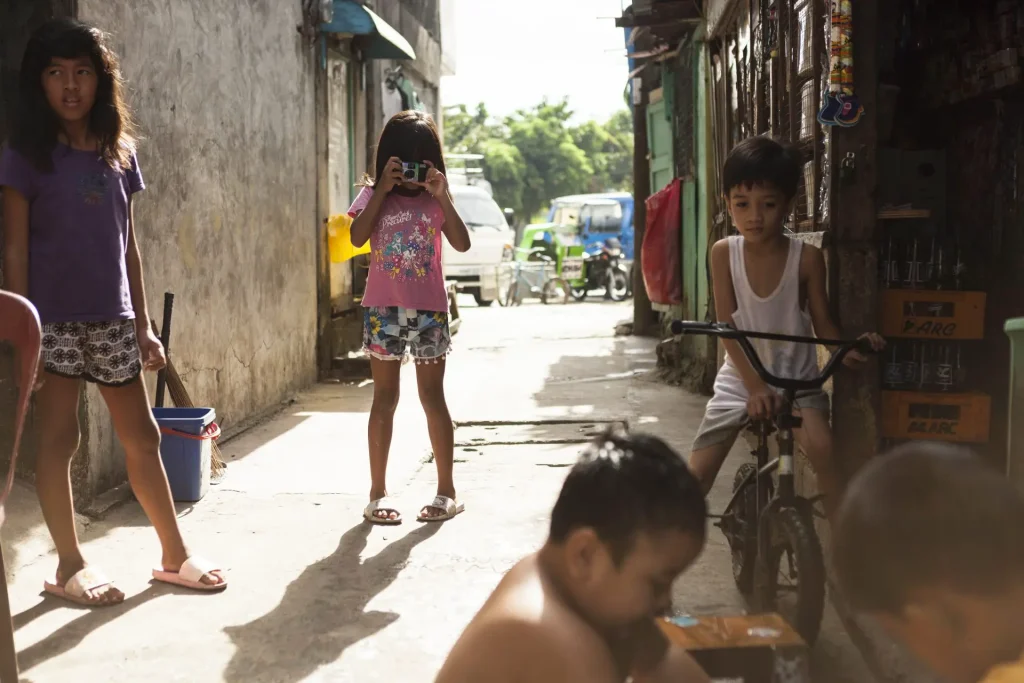
H: So how can people help then? What can the readers of this website do to get involved or in any way support the project should they feel moved to do so?
N: here are a lot of ways to get involved:
The quickest and most beautiful way is to buy the artwork! One poster finances one month of school. You will get a unique artwork plus the knowledge that you have helped send a child to school. We ship all over the world.
Best selling images:
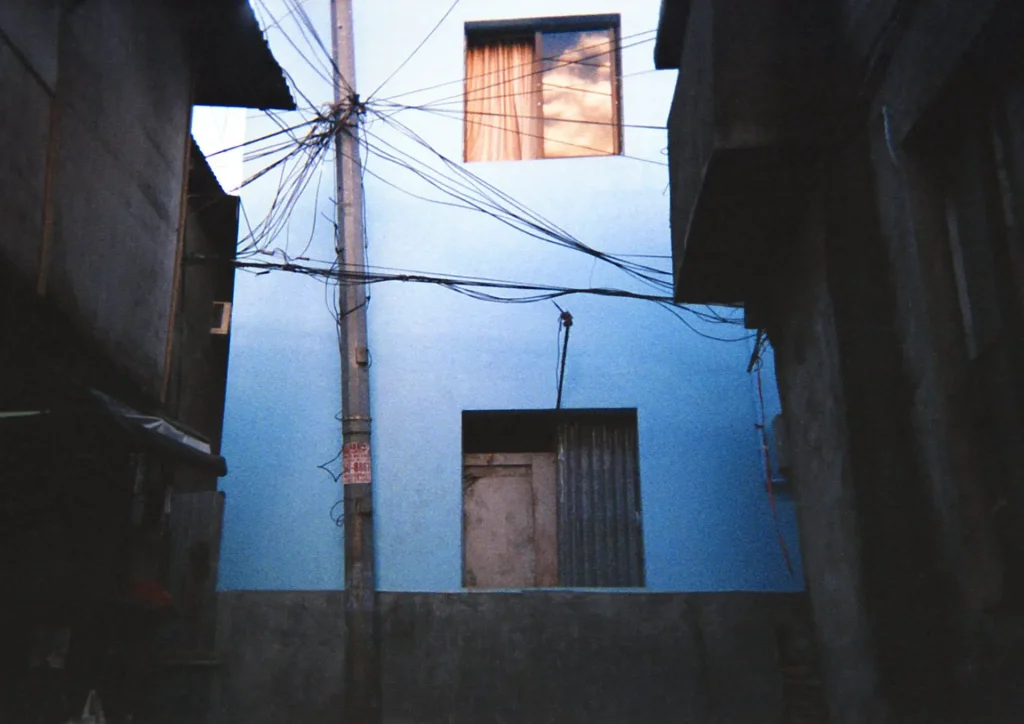
https://art-meets-education-shop.myshopify.com/products/clouds-in-the-window
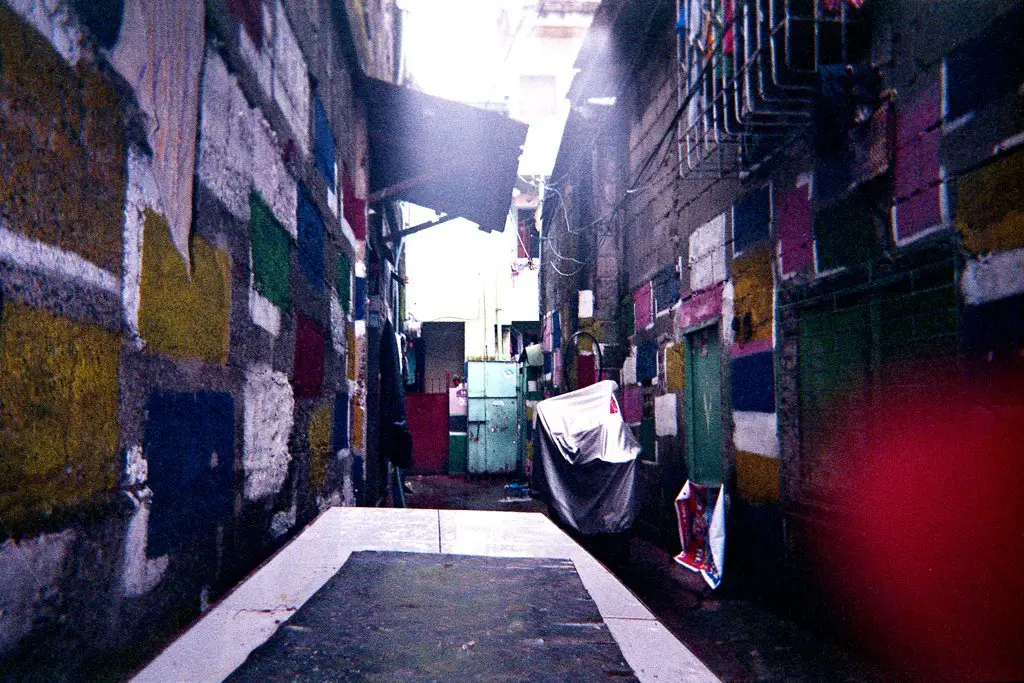
https://art-meets-education-shop.myshopify.com/products/colored-wall
We also love working together with people who have fresh ideas, like organizing a fundraiser charity exhibition, or a charity auction where photographers donate prints to be sold. Or if you organize a photography festival, help us get our foot in the door, so we can exhibit and sell our artwork ourselves.
We look for anything that helps us generate awareness. If you have a great idea and want to combine it with a meaningful cause, contact me!
We need volunteers, especially in Germany/Berlin. We are looking for helping hands and/or ownership of tasks in the office, exhibition preparation or sales staff.
Volunteer here
If you want, you can support us by becoming a regular paying member of our NGO as either a private person or corporation.
https://www.artmeetseducation.de/unterstuetzen/mitglied
And of course, we like donations. Donations help us get stabilized. If we don’t sell enough artwork, we depend on donations to finance our artists’ education.
https://www.artmeetseducation.de/unterstuetzen/spenden
Talk about us, post, share, like and follow us on YouTube, Instagram and Facebook.
Our main goal is to find a company that wants to build up a long term relationship with us, like we do with our kids.
Let’s develop ideas together that benefit everyone.
H: Thanks Nico, I think it’s a wonderful thing what you’re doing, and I wish you all the best for the future of the project!
A final note from Hamish: During the process of this interview, Nico sent me this video. If the above hasn’t moved you, or you’d like to get more of a feel for this project, I urge you to watch it:
https://www.youtube.com/watch?v=h6Oso01nm-c&feature=youtu.be
Share this post:
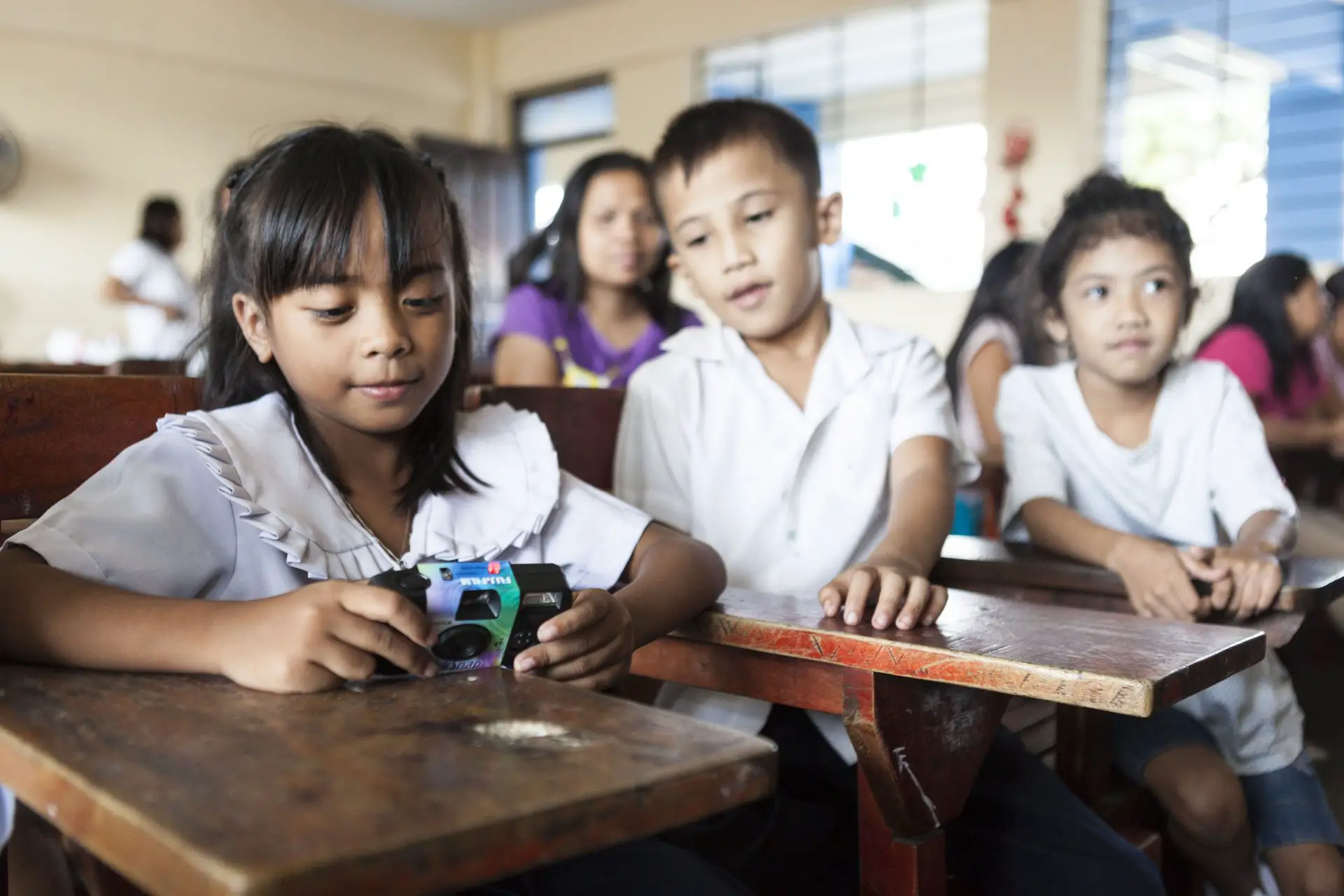
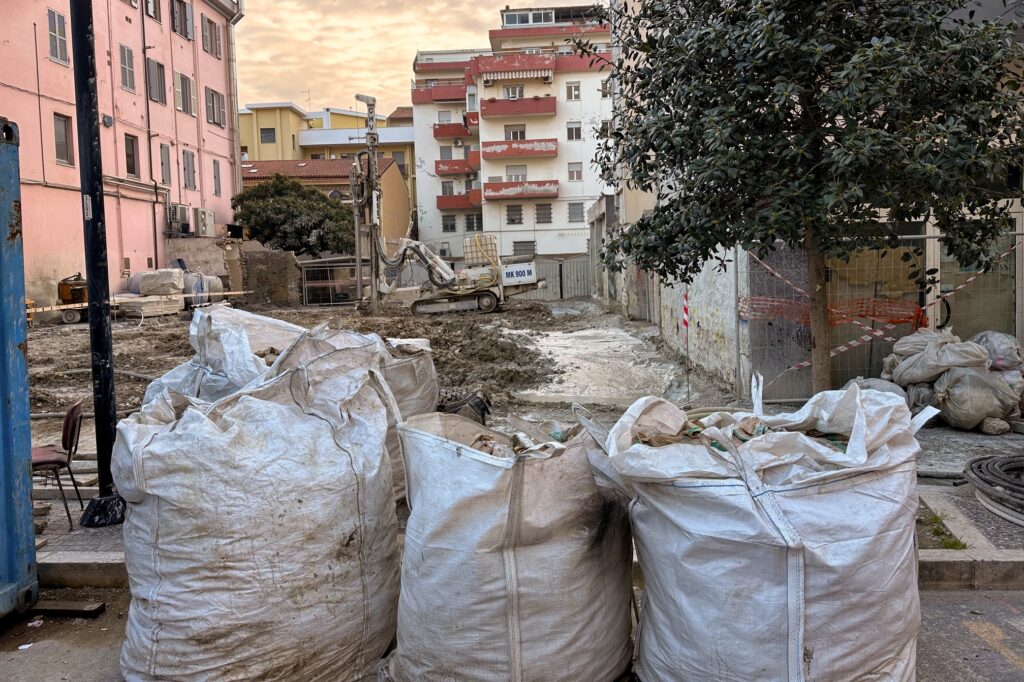
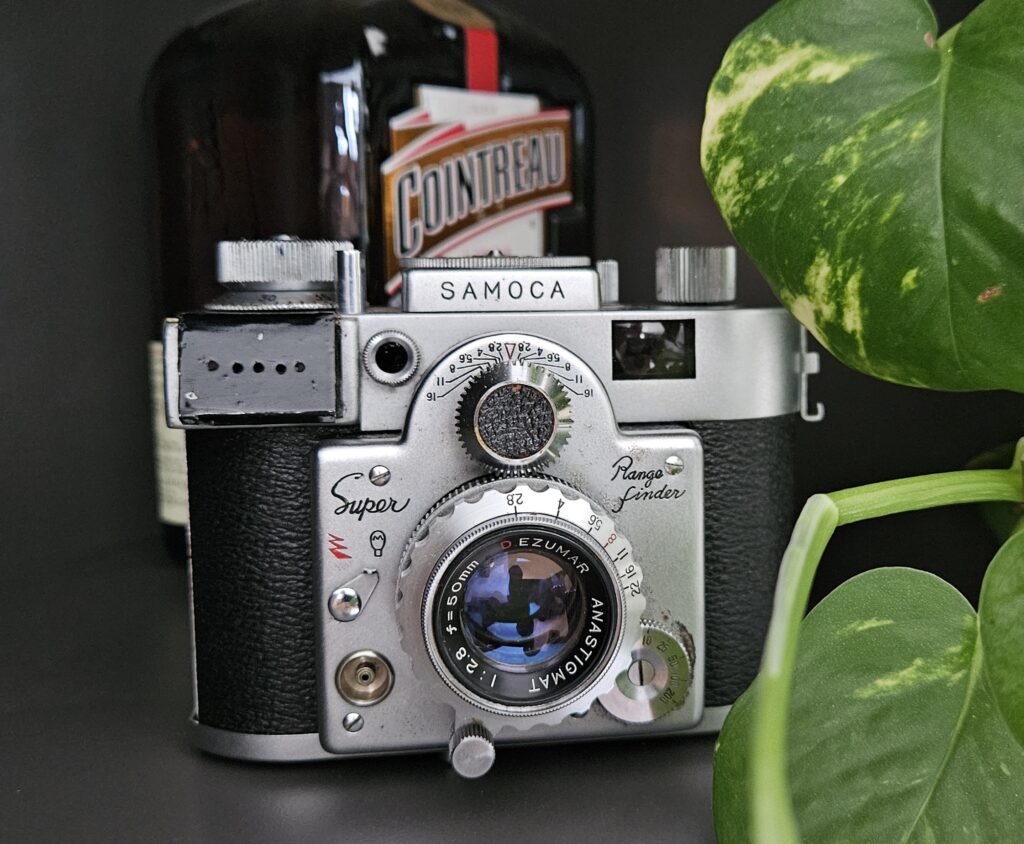

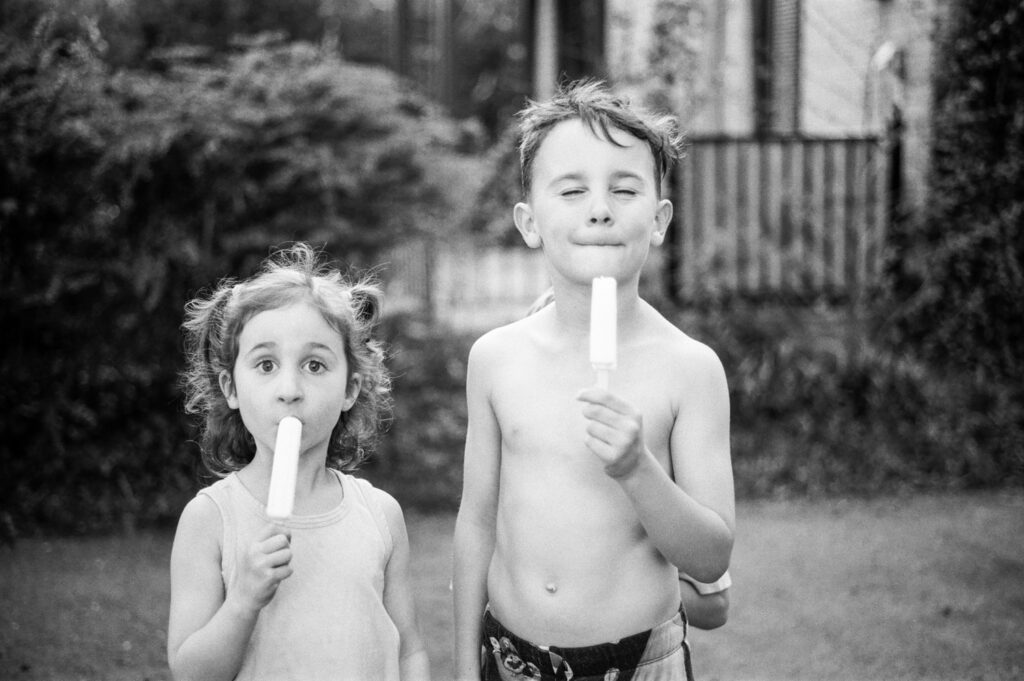




Comments
Nick Ambrose on Art Meets Education – Educating Underprivileged Children Through Photography – an Interview with Nico Klein-Allermann
Comment posted: 17/02/2020
An interesting article.
I'm not sure if you are aware of the advertising that also pops up on your site but I feel you ought to be aware that adverts for 'one night girls' alongside an article on educating young children would be seen as inappropriate.
Nick Lyle on Art Meets Education – Educating Underprivileged Children Through Photography – an Interview with Nico Klein-Allermann
Comment posted: 17/02/2020
eric on Art Meets Education – Educating Underprivileged Children Through Photography – an Interview with Nico Klein-Allermann
Comment posted: 17/02/2020
WONDERFUL !
SO GREAT !
CONGRATULATIONS !
You are a wonderful person, a wonderful teacher.
More and more persons use film photography to enlighten kids creativity !
jeremy north on Art Meets Education – Educating Underprivileged Children Through Photography – an Interview with Nico Klein-Allermann
Comment posted: 19/02/2020